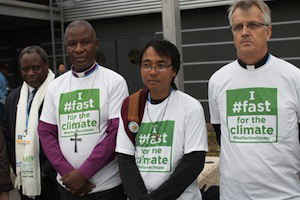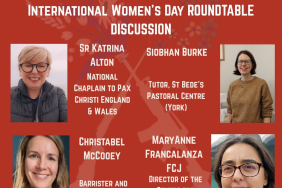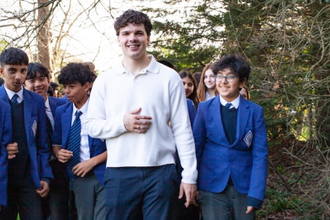Paris Blog 6: Faiths become a powerful lobby for climate action

Today I found myself in the bedchamber at Versailles Palace of King Louis XlV of France, and learnt that it was situated facing East to catch the first rays of the rising sun. Louis, the Sun King, chose the sun as his emblem - said my commentary - because of its light, its life giving qualities and its solar power. Wait a minute, I played the commentary back, Louis didn't say that last point. That clearly came from my own mind, and is an indication of how single-minded we climate campaigners can be.
We forget that, despite world leaders telling us on Monday that the eyes of the world are on these climate talks, it may not actually be true. For many people, the international efforts to reduce human-induced global warming do not appear to be on their radar. Even here in Paris people go about their daily lives appearing not to be paying much attention to the talks, despite posters and several prominent exhibitions in the capital. I am staying at a Catholic convent and little interest in the talks is obvious amongst all the comings and goings of the various Catholic groups around the table at breakfast.
And yet, I sense something very significant is happening among people of faith. All year the first day of the month has been a global day to Pray and Fast for Climate Justice. Yesterday, some of my colleagues in Justice and Peace attended a packed service in a Paris Church to end the 1 December climate fast organised by counterparts in Paris. Earlier in the day over 20 faith leaders, with youth, political and civil society representatives, sat down for a unique lunch at COP21 at a table with knives and forks but no food, in a public demonstration of their hunger for climate justice. Yeb Saño, former Philippines' chief climate negotiator, Dr Thabo Makgoba, Archbishop of Cape Town, and Imam Ibrahim Saidy of Norway were among the 'diners' taking part in the 'Fast For The Climate' at the UN climate summit. The event was a chance for the campaigners to tell gathered journalists and COP21 delegates why they had chosen to abstain from food: to show solidarity with communities worst affected by global warming and make a compelling call for climate justice.
Recently, the Yale Program on Climate Change Communication and the George Mason University Center for Climate Change Communication in the United States released a special report from their new study: 'The Francis Effect: How Pope Francis changed the conversation about global warming'. It reported that today more Americans and more American Catholics are worried about global warming than six months ago, and more believe it will have significant impacts on human beings. Some of these changes in Americans' and American Catholics' views can be attributed to the Pope's teachings, as 17 percent of Americans and 35 percent of Catholics say his position on global warming influenced their own views. There were significant changes after the Laudato Si' environment encyclical was released in June, and again after Pope Francis visited the US in the Autumn. More US Catholics than ever before see climate change as a moral issue and the Global Catholic Climate Petition was launched in the US.
And climate advocacy is building up in other faiths too. In August, Islamic leaders called on the world's 1.6 billion Muslims to play an active role in combatting climate change and urged governments to conclude an effective universal climate change agreement in Paris. In October, Buddhist leaders from around the world announced a Buddhist Climate Change Statement, urging government leaders to move away from fossil fuels and move toward 100 percent renewable energy. In November, the Hindu Declaration on Climate Change was launched, calling for action from both the world's 900 million Hindus as well as by the governments meeting in Paris at COP21.
On 29 October, the Black Church Climate Change Statement was released. The statement reads: "As leaders in the Black Church, we view climate change as a moral issue and one of the greatest public health challenges of our time, particularly for black and other marginalised communities. Breathing dirty, carbon-polluted air, that causes climate change, contributes to thousands of asthma attacks, hospital visits, and premature deaths every year. Black and lower income communities are often hit the hardest by climate change in the United States. In Genesis, breath is declared a God-given right, yet, almost 40 percent of the six million Americans living in close proximity to a coal power plant are people of colour."
Those of us in the churches who have engaged with climate justice for many years do not feel as on the fringe as we used to. Indeed, the churches and other faiths have become a powerful lobby for climate action.















